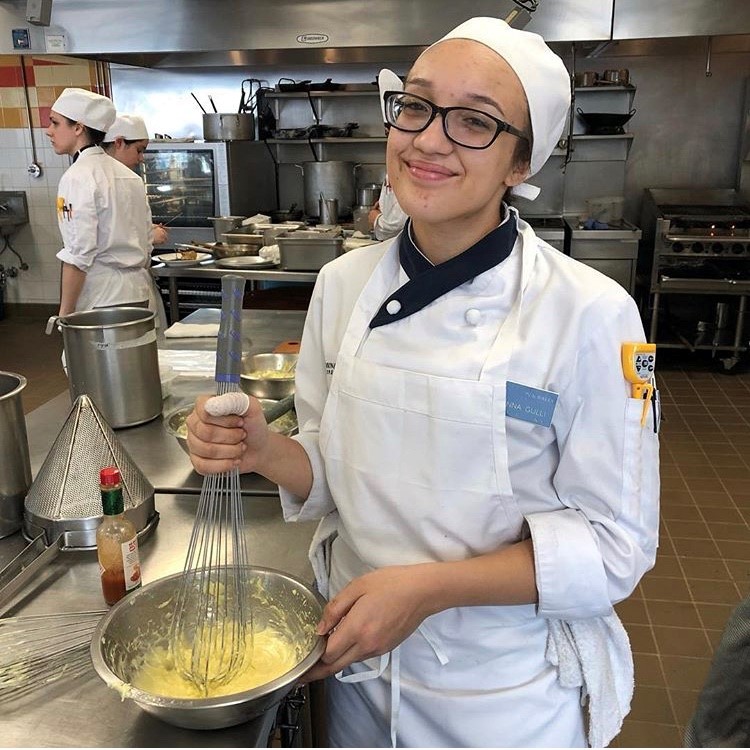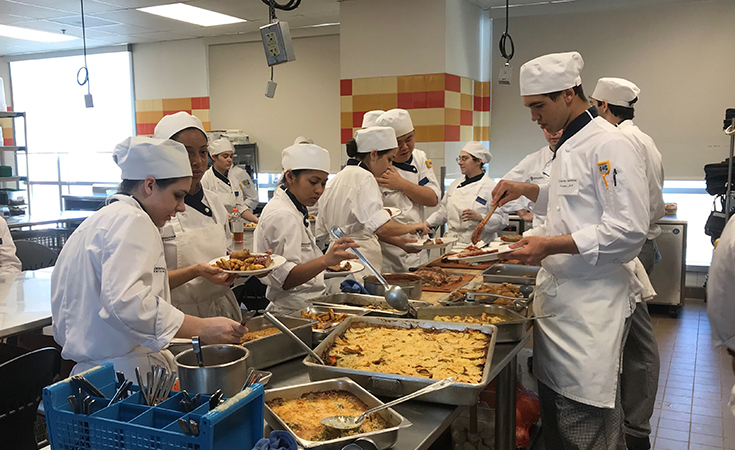Culinary Fundamentals will Change the Way the World Eats
By Holly Miller '19
May 2019
During a busy production day in one of Johnson & Wales University Cuisinart Center for Culinary Excellence’s culinary labs, 18 first-year students demonstrated more than their culinary skills. The course, Culinary Fundamentals (CUL1035), is designed for students to gain skills in the essential techniques of grilling, sautéing, baking, braising, stewing, broiling, roasting and frying while producing and tasting complementing contemporary sauces, including béarnaise, mornay and classic tomato. "In this course, students become the stewards of the kitchen," notes Branden J. Lewis '04, '06, CEC, associate professor, College of Culinary Arts. He explains how this course is preparing students to become future leaders of the food industry.
An Inside Look at Production Day
As first-year Culinary Arts students, they focus on the technique of preparing dishes. Students learn that communication is critical for a successful production day. Amidst the clatter of pots and pans, dishwashing, and aromas of freshly diced herbs and spices, students seem to shout over one another. To the contrary, these are the commands and warnings of a professional kitchen. “Hot! Watch behind you. Comin’ through!” they call as hot pans are quickly passing by.
“In the middle of a production day, we are all dependent on each other,” says Brianna Gulli ’22. “If one group is relying on another group and makes a mistake, it can cause everyone to fall behind. It will be interesting to see how everything comes together.”

On this day, shepherd’s pie, meat loaf, panko chicken wings, mac and cheese, and baked cauliflower were among some of the dishes students prepared simultaneously against the clock. Once the food is cooked, the students clean their stations and prepare for “family lunch.” Students can enjoy their dishes while reflecting on their progress.
Sustainability
Chef Lewis shares his commitment to the sustainable food movements with his students while preparing them to implement those practices in future careers. Sustainable food practices are integrated into the curriculum from a student's first year until graduation. In Culinary Fundamentals, students demonstrate sustainability in the kitchen by turning potato scraps into mashed potatoes, repurposing chicken bones into broth, and gathering remaining scraps to be delivered to a nearby pig farm.
Current Students to Future Leaders
Over his eight-year teaching career, Chef Lewis has noticed the evolving mindset of students. Reflecting on his most recent cohort of students he says, “They have a critical eye on industry and its impact on sustainability, the environment, animal welfare, and social justice.”
When asked how this fundamentals course is changing the way the world eats, Chef Lewis responded, “By building upon basic kitchen skills, this course creates a platform for future industry leaders to be able to advocate in the community and society. Chefs have a major influence in sustainability practices and purchasing decisions. Chefs influence dietary habits, the consumption of food, and food literacy.”
Culinary fundamentals at JWU are shaping the way future chefs think and ultimately changing the way the world eats.
